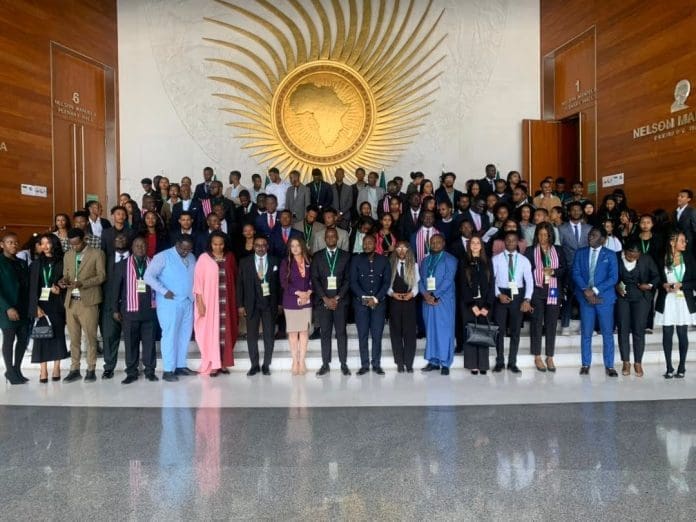The Federation of African Law Students (FALAS) has kicked off its fifth annual continental conference at the African Union Headquarters in Addis Ababa, Ethiopia, marking a milestone celebration for the Pan-African organization. Running from October 19 to 25, 2025, the gathering has attracted 250 delegates from 16 countries, making it the largest assembly of future legal minds on the continent.
This year’s conference marks the 5th Anniversary of the Federation and is being held in partnership with the African Union, through its Women and Youth Division. The event operates under the theme “Strengthening African Youth Leadership through Ubuntu for a United and Independent Africa,” aligning with the AU’s 1 Million Next Level Strategy aimed at empowering youth across the continent.
What makes this conference particularly groundbreaking isn’t just its location or anniversary status. For the first time in FALAS history, the conference has officially opened to non-law students and young people across Africa, breaking away from its traditional law student exclusivity. This bold shift reflects the organization’s evolving vision of inclusive Pan-African legal development.
International FALAS President Seyram Kofi Seyram called the partnership with the AU a historic achievement. “This is a historic gathering, and the partnership with the AU is just the beginning of change-making,” he said during his opening remarks. His excitement seems justified given the caliber of participants and the symbolism of hosting at Africa’s most important diplomatic institution.
The week-long program brings together a diverse mix of law students, lawyers, judges, academics, and diplomats for networking sessions, panel discussions, and policy deliberations. But this isn’t merely an academic exercise or networking opportunity. The conference aims to produce concrete policy recommendations addressing African unity, leadership ethics, and human development that could influence continental governance.
Ghana’s presence at the conference carries particular weight. Dr. Kingsley Agyemang, Member of Parliament for Abuakwa South and a member of Ghana’s Parliamentary Select Committee on Health, will serve as one of the Guest Speakers. His keynote address focuses on “Legislating for Health Justice: Advancing Universal Health Coverage in the Pan-African Context,” highlighting the growing recognition that legal frameworks and health policy intersect in critical ways.
The Ghana connection runs deeper than individual speakers. The Office of the President of the Republic of Ghana, through its Diaspora Affairs Directorate, has announced a groundbreaking partnership with FALAS, positioning the West African nation as a leader in Pan-African legal diplomacy. This partnership extends beyond conference participation to include initiatives like a Diaspora Legal Engagement Desk, youth legal internships, and plans for a Diaspora Legal Summit in Accra.
The conference will also showcase the launch of the FALAS @5 Commemorative Magazine, documenting five years of youth-led impact across Africa. This publication serves as both celebration and accountability tool, tracking how the organization has influenced legal education and policy development since its establishment.
Attendance comes at a cost. Registration packages range from $450 for double occupancy to $550 for single occupancy, covering accommodation, meals, local transport, conference materials, and certification by the African Union. While these fees might seem steep for students, the AU certification and networking opportunities represent investments in future careers.
The presence of Mahmoud Ali Youssouf, Chairperson of the African Union Commission, is expected to provide a powerful moment of institutional recognition. His participation signals the AU’s commitment to bridging the gap between policy formulation and practical implementation in the legal sphere, acknowledging that today’s law students will shape tomorrow’s continental jurisprudence.
FALAS now represents law students and young legal professionals across more than 45 African countries, with reach extending into diaspora communities in North America, Europe, and the Caribbean. This geographical spread transforms the organization from a student association into a genuine Pan-African movement with capacity to influence legal thinking across borders.
The choice of theme carries deliberate philosophical weight. Ubuntu, the African concept emphasizing humanity’s interconnectedness, frames discussions about independent African development rooted in indigenous values rather than imported frameworks. It’s a subtle but important positioning that distinguishes African legal thinking from colonial legacy systems.
What happens after the closing ceremonies may prove more important than the conference itself. Five years in, FALAS faces the challenge of translating enthusiastic gatherings into sustained institutional change. The policy recommendations emerging from Addis Ababa will test whether the organization can move beyond aspirational statements toward concrete influence on how African nations develop and implement legal frameworks.
The conference also represents a generational shift in African legal leadership. Unlike previous generations who often looked externally for validation and frameworks, this gathering emphasizes African solutions to African challenges. Whether that translates into genuine policy innovation or remains rhetorical positioning will become clear in coming years.
For now, the sight of 250 young legal minds gathered at the AU Headquarters carries its own symbolic power. These delegates return home with expanded networks, fresh perspectives, and certification from Africa’s premier continental body. Some will become judges, legislators, diplomats, and legal scholars who remember this week in Addis Ababa as a formative experience.
The partnership between FALAS and the African Union could signal a broader trend toward institutionalizing youth participation in continental governance. Rather than token representation, young people gain platforms to contribute substantively to policy discussions that will shape their futures.
As the conference continues through October 25, participating countries watch to see whether FALAS can sustain momentum beyond its fifth anniversary. The organization faces the perpetual challenge of student-led movements: how to maintain institutional memory and impact when membership constantly turns over.
Source: newsghana.com.gh











